|
Dolce far niente
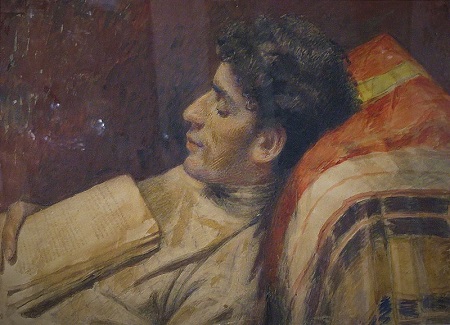
Slapende man met boek door Yehuda Pen
Een probleem
Vandaag vroeg mijn zoontje
met angstige stem :
'Als iemand dood gaat
wat gebeurt er dan met hem ?'
Nu ken ik wel iemand
die daarover zegt :
'Wie dood is komt in de hemel terecht
dus boven de wolken, dus altijd mooi weer
met een bal in het gras en ijsjes, meneer.'
Maar weer iemand anders vertelde zo waar
'Als je dood bent, dan komt er een tovenaar.
Dan tovert hij aan je en word je een dier
een mus of een tijger, een leeuw of een mier.
Zelf mag je kiezen welk dier je wilt zijn,
een mug of een olifant of een konijn.'
Maar op een morgen ben ik gegaan
naar een man die heel oud was, dus gauw dood zou gaan
'Of ik een dier wordt,' zei deze man
'Of ik in de hemel kom, ik weet er niets van,
maar als ik dood ben is 't eerste wat ik doe
honderd jaar slapen. Want ik ben moe…'
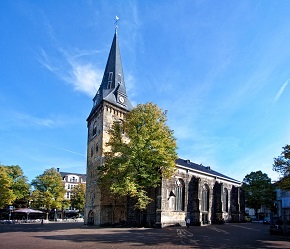
Willem Wilmink (25 oktober 1936 – 2 augustus 2003)
De Grote Kerk in Enschede, de geboorteplaats van Willem Wilmink
De Amerikaanse dichteres Jorie Graham werd geboren op 9 mei 1950 in New York geboren. Zie ook alle tags voor Jorie Graham op dit blog.
Mother’s Hands Drawing Me
Dying only mother’s hands continue
undying, blading into air,
impersonal, forced, curving it
down — drought incessant rain
revolution and the organs shutting
down but not these extremities,
here since I first opened my first
eyes first day and there they were,
delicate, pointing, will not back off,
cannot be remembered. Mother,
dying — mother not wanting to
die — mother scared awakening
each night thinking she’s dead —
crying out — mother not
remembering who I am as I run
in — who am I — mother we must
take away the phone because who
will you call next — now saying I
dreamt I have to get this dress on, if
I get this dress on I will not die —
mother who cannot get the dress on
because of broken hip and broken
arm and tubes and coils and pan
and everywhere pain, wandering
delirium, in the fetid shadow-
world — geotrauma — trans-
natural — what is this message
you have been scribbling all your
life to me, what is this you drag
again today into non-being. Draw it.
The me who is not here. Who is the
ghost in this room. What am I that
is now drawn. Where are we
heading. Into what do you throw
me with your quick eye — up onto
me then down onto the blank of the
page. You rip the face
off. I see my elbow there where
now you bend it with the pen, you
fill it in, you slough it off me onto
more just-now making of more
future. You look back up, you take
my strangeness from me, you
machine me, you hatch me in. To
make what, mother, here in this
eternity this second this million
years where I watch as each thing is
seen and cancelled-out and re-
produced — multiplying aspects of
light in the morning air — the
fingers dipping frantic into the bag
of pens, pencils, then here they
are — the images — and the hands
move — they are making a
line now, it is our world,
it horizons, we ghost, we sleepwalk,
everything around us is leveled,
canceled, we background, we
are barely remains, we remain, but
for what, the fingers are deepening
curling, bringing it round, the mind
does not — I don’t think — know this
but the fingers, oh, for all my life
scribbling open the unseen,
done with mere things, not
interested in appraisal, just
seizure — what is meant by
seizure — all energy, business-
serious, about direction, tracing
things that dissolve from thingness
into in-betweens — here firm lines,
here powdery lift off — hunger,
fear — the study begins — all is not
lost — the thought a few seconds
wide — the perusal having gone
from here to here, aggregates,
thicket, this spot could be where
we came in, or where we are saved,
could be a mistake, looks across
room through me, me not here
then, me trying to rise in the beam,
nothing I do will make it
happen, rock-face, work that
excludes everything that is not
itself, all urge in the process of
becoming all effect, how can I touch
that hand like snow moving, when
is it time again as here there is no
time, or time has been loaded but
not cocked, so is held in reserve, all
wound up, I was also made but not
like this, I look for reluctance,
expectation, but those are not the
temperatures — if only I could be in
the scene — my time is not
passing — whose is the time that is
passing — the hands rushing across
the paper, cloudy with a sun
outside also rushing scribbling —
wisdom turning itself away from
wisdom to be — what — a thing that
would gold-up but cannot, a patch
of blue outside suddenly like the
cessation of language when lips
cease to move — sun — self-
pronouncing — I want this to not be
my writing of it, want my hands not
to be here also, mingling with hers
who will not take my hand ever into
hers, no matter how late we are, no
matter that we have to run so fast
through all these people and I need
the hand, somewhere a radiant
clearing, are we heading for it, head
down towards the wide page, hand
full of high feeling, cannot tell if it
takes or gives, cannot tell what it is
that is generating the line, it comes
from the long fingers but is not
them, all is being spent, the feeling
that all — all that we need or have —
would be spent for this next thing
this capture, actually loud though
all you can hear is the small
scratching, and I feel dusk
approaching though it is still early
afternoon, just slipping,
no one here to see this but me, told
loud in silence by arcs, contours,
swell of wind, billowing, fluent —
ink chalk charcoal — sweeps, spirals,
the river that goes
nowhere, that has survived the
astonishments and will never
venture close to that heat again, is
cool here, looking up at what,
looking back down, how is it
possible the world still exists, as it
begins to take form there, in the not
being, there is once then there is the
big vocabulary, loosed, like
a jay’s song thrown down when the
bird goes away, cold mornings,
hauling dawn away with it, leaving
grackle and crow in sun — they have
known what to find in the unmade
undrawn unseen unmarked and
dragged it into here — that it be
visible.
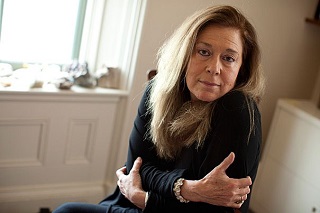
Jorie Graham (New York, 9 mei 1950)
De Nederlandse dichter en schrijver Pieter Boskma werd geboren in Leeuwarden op 9 mei 1956. Zie ook alle tags voor Pieter Boskma op dit blog.
Drie liedjes uit het zwarte water
(licht lied)
Liefje als het later
aan het zwarte water
onder lichtgeklater
nog als nu als nu kon zijn
Heel ons leven staat er
en alles alles gaat er
in een stille schater
door ons terug in zijn voorbij
Liefje als het later
zoals nu als nu kon zijn:
goud over berg en water
en dat oude goud zijn wij.
(donker lied)
Maar als het als het later
aan het lange zwarte water
onder duisternisgeklater
een alleen alleenzijn is
En jouw leven staat er
als een schaduw naast en
begint opnieuw te praten
als van onder aarde
Dan zal ook ik ontwaken
in de opgegraven stem
waarmee ik over water
naar je kom toegerend
Klamme lente
Een boeket violen staat
te zwiepen op de radio.
Ergens in een studio
zweet de dirigent zich dood.
Het is inderdaad een warme dag.
Anderhalf miljoen mussen
vielen van de daken - toch
glimlachen wij welterusten.
Slaap je al? Ik ook niet, nee.
Het is te warm, te warm...
Mijn God wat ben je klam...
Hoe laat? Een uur of twee.
Ook de kikkers raken al
vermoeid na drie keer kwaken.
Hoog in de concertzaal
puffen vaag de sterren
en beginnen zoek te raken.
Het waterig applaus wordt
afgebroken door het nieuws.
Negen Mei en dertig graden,
voorbij flitst het bestaan.
Bekkenslag. Een buiging.
En dan het zachte kraken
van de bevroren nacht.
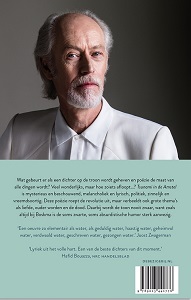
Pieter Boskma (Leeuwarden, 9 mei 1956)
Cover
De Amerikaanse dichter Charles Simic werd geboren in Belgrado op 9 mei 1938. Zie ook alle tags voor Charles Simic op dit blog.
Old Couple
They're waiting to be murdered,
Or evicted. Soon
They expect to have nothing to eat.
In the meantime, they sit.
A violent pain is coming, they think.
It will start in the heart
And climb into the mouth.
They'll be carried off in stretchers, howling.
Tonight they watch the window
Without exchanging a word.
It has rained, and now it looks
Like it's going to snow a little.
I see him get up to lower the shades.
If their window stays dark,
I know his hand has reached hers
Just as she was about to turn on the lights.
So Early in the Morning
It pains me to see an old woman fret over
A few small coins outside a grocery store -
How swiftly I forget her as my own grief
Finds me again - a friend at death's door
And the memory of the night we spent together.
I had so much love in my heart afterward,
I could have run into the street naked
Confident anyone I met would understand
My madness and my need to tell them
About life being both cruel and beautiful,
But I did not - despite the overwhelming evidence:
A crow bent over a dead squirrel in the road,
The lilac bushes flowering in some yard,
And the sight of a dog free from his chain
Searching through a neighbor's trash can.
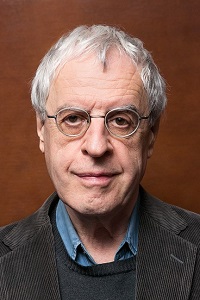
Charles Simic (Belgrado, 9 mei 1938)
Zie voor nog meer schrijvers van de 9e mei ook mijn blog van 9 mei 2018 en ook mijn blog van 9 mei 2017 en ook mijn blog van 9 mei 2015 deel 2.
09-05-2019 om 19:17
geschreven door Romenu 
Tags:Willem Wilmink, Jorie Graham, Pieter Boskma, Charles Simic, Dolce far niente, Romenu
|

